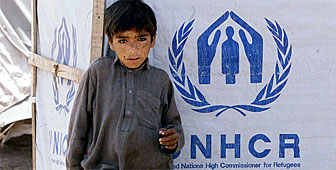Aid agencies mobilise for Afghan crisis

As the United States prepares for possible military action against Afghanistan, aid agencies are urgently mobilising staff and resources in anticipation of a humanitarian crisis in a country already ravaged by war and drought.
“This could be a massive operation. We have to be in place now,” says Peter Kessler, a spokesman for the Office of the United Nations High Commission for Refugees (UNHCR).
The UNHCR, which says tens of thousands of people are already on the move, is preparing for the worst. It has ordered 20,000 tents, 20,000 kitchen sets and plastic sheeting for a million people to be sent to areas bordering Afghanistan, where four million refugees already live.
The Geneva-based agency has sent several experienced emergency managers to Pakistan, and is in the process of setting up three crisis teams in the country.
It has appealed for $6 million in initial emergency funding to cover the cost of the deployment, and will ask donors for more money this week.
Ahead of winter, military campaign
Kessler says that with winter approaching and with Afghanistan’s neighbours being large countries with complicated logistics, it was vital to get people and relief supplies into place as quickly as possible. He said once a military campaign was underway, it would absorb a great deal of the air traffic, port capacities and supply routes.
“We need to be as on top of things as the military,” Kessler told swissinfo.
He says that the current situation has the potential to be “many times worse” than other recent crises, such as the Balkans, East Timor or Iraq, because of the already fragile state of the Afghan people. Some three million people already rely on the UN to provide them with food.
“We know the Afghan situation can become tragically fluid very quickly. After 20 years of conflict, Afghans know how to flee, and in large numbers,” Kessler told swissinfo.
Border crossings
There is also a diplomatic aspect to the UNHCR’s work. It has been pressing Iran, Pakistan and Tajikistan to reopen their borders with Afghanistan to allow refugees in and not to send back those that have managed to make it across the frontier.
The High Commissioner, Ruud Lubbers, has also called on the US to carefully weigh the humanitarian implications of a military strike.
While the UNHCR is rapidly deploying additional staff and resources to the region, the International Committee of the Red Cross (ICRC), which is also located in Geneva, is adopting a different approach. It relies on the staff already in place to deal with emergencies.
“Wherever we go in the world, we are prepared to manage this kind of situation,” says Roland Silder, head of roving missions at the ICRC. “We have emergency measures already prepared which we can implement when they are needed.”
Expatriates asked to leave
The ICRC’s expatriate personnel were asked last Sunday to leave Afghanistan, and they are directing operations from the Pakistani city of Peshawar. But 1,000 national employees are continuing to work inside the country, and many of them have received specialised training so that they can take the reins in a crisis.
“We have to adapt our activities according to the situation,” Sidler told swissinfo.
On the assumption that its foreign staff will not be allowed back into Afghanistan, the ICRC has drawn up contingency plans for cross-border missions to deliver food, shelter and medical supplies. It is also stepping up cooperation with local Red Crescent societies and other international aid organisation.
In addition to foreign personnel forced to leave Afghanistan earlier this week, the ICRC can call on an additional 32 expatriate and 320 local staff in Pakistan, Tajikistan and Uzbekistan.
The International Federation of Red Cross and Red Crescent Societies is increasing the operational capacity of the national societies in the region.
by Roy Probert

In compliance with the JTI standards
More: SWI swissinfo.ch certified by the Journalism Trust Initiative
You can find an overview of ongoing debates with our journalists here. Please join us!
If you want to start a conversation about a topic raised in this article or want to report factual errors, email us at english@swissinfo.ch.